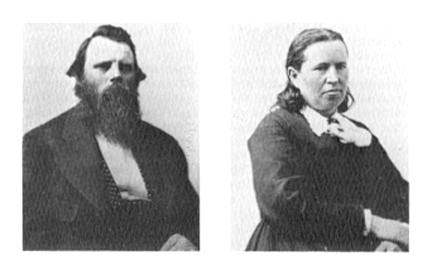Women in mining communities

By Sandy Vasko
The subject of women has been much bandied about in recent weeks. Respect for women, equal pay for women, women’s rights, etc. etc. Broad statements have been made about the history of working women and women’s role in the community.
As a historian, I became interested in the role women have played in various parts of the country at various times. This is the result of my search:
First, we look at the1849 gold rush in California. During the white heat of the gold rush, the Joliet Signal printed letters sent back home from the men of Will County who had gone in search of their fortunes. A Mr. Gesford wrote back, “Women seem to be prized the most of anything I have as yet seen. A good housekeeper can get $300 ($11,175 today) per month, so says an old settler. It is something very singular; but women are treated with more respect here than anywhere else I have been, and they seem to enjoy better health than the nobler sex.”
A woman’s rights advocate who went to the gold fields herself wrote back, “Let the fact be known to all who care to know it, that the utmost possible deference and care are shown to females. No women need fear to come here, who has the sense and energy to take care of herself elsewhere; and she will have a better capital than the gold of the mines. If there had one thousand females sailed last May, they would, all who chose to, be profitably employed this day. Everything here is scarcer than gold.”
So, let’s fast forward to the mining community of Braidwood about 30 years later.
The first mention I can find treatment of women in Braidwood comes from the March 9, 1872, edition of the Wilmington Advocate: “John Ellager is a Braidwood Bohemian; he believes that women have rights, and among them, the right to be shot at. On Thursday last, his landlady, Mrs. Schuman, dunned ‘honest John’ for the amount of his board bill. John being sensitive in regard to such matters drew a pistol and assaulted Mrs. S., with intent to do bodily injury. That lady proved the better man of the two, and wrested the pistol from the ‘gentle savage’ and has since sworn out a warrant for his arrest.”
From January 24, 1874: “A young man in Braidwood has said, ‘Dearest, will thou be mine?’ to five women, and four of them are suing him for it. Braidwood has always been famous for its number of ‘mines.’”
In 1875: “Two corn shellers have been running near the depot for the last ten days. The small boys and old women get up a corner on cobs.”
Well, to be fair to get respect, you must earn it. What did the women of Braidwood do to earn their poor treatment? In 1873: “Last week, the back yard of a certain saloon, in this city, was the scene of a square fight between two women. We refrain from giving the names of the parties, this time; but should it be repeated, we will publish the names in full.”
During the mining strike of 1874 we read, “On Monday four pit bosses were assaulted with violence by a mob of women for having entered the mines for the purpose of clearing the roadways and putting matters in shape.”
In 1880: “Jo Meyers believes in enforcing the municipal laws, and with that view he impounded a number of hogs that were found running at large on Thursday. While he went down to Garrity’s for ropes, etc., a number of women liberated the porkers.” and “Two colored women from the G lot vicinity had a free fight the other day; not very free, either, as Sally Brown had Doney Hamilton fined $2 and costs for the fun.”
In 1883: “For stealing coal at the railroad chute at the unfashionable hour of 5 o’clock in the morning, Sept. 1st, two or three women were fined $1 and costs each. Then one of them, Mrs. Zobek instigated the arrest of four others, upon the principle that the honors (?) should be divided.”
It seems obvious that women were not only disrespected in Braidwood, many of them earned that disrespect. So why the difference between the mining communities of the gold fields of 1849 and the coal fields of 1879?
I think part of the difference is that the men of the gold field could afford to be nice. In one summer, they could reap $5,000 or more. A coal miner would be lucky to see that in a decade.
Also, the men of the gold field came from a broad spectrum of society. There were doctors, lawyers, bankers, farmers, etc. The men of the coal field were coal miners in the old country, they were coal miners here, and most would be born to mine coal and die doing so.
That kind of future can create despair and depression, which can lead to violence.
Sandy Vasko is Director of the Will County Historical Museum & Research Center and President of the Will County Historical Society.
